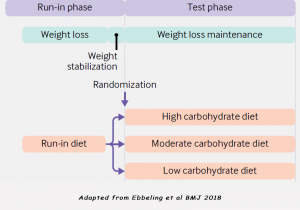24th December 2018, Dr Chee L Khoo

Losing weight is the second hardest thing to do. The hardest is keeping that weight off. With weight loss, hunger increases and energy expenditure decreases as the body adapts physiologically to the weight loss. The kilogram loss is not all fat loss. Some of the losses are muscles and with less muscle bulk, basal metabolic rate also decreases adding further to the decrease in energy expenditure. Before long, the weight starts piling up again. The key then in preventing weight regain is to prevent the reduction in energy expenditure. That all sounds easy, doesn’t it?
A recent novel trial might shed some light on the how that can be achieved and the results can greatly assist GPs in minimising weight regain in our patients. The trial compared the effects of various diets in patients after initial weight loss. 1685 people were screened and 234 suitable participants were enrolled. In the run-in phase, participants were provided with 60% of their estimated needs. 45% of total energy came from carbohydrate, 30% from fat and 25% from protein.
Of those enrolled, 164 achieved 12% weight loss over 10 weeks. They were then randomised to either high (60% carbohydrates), moderate (40% carbohydrates) or low (20% carbohydrates ) arms. The protein component was fixed and the rest of the nutrients were made up with fats. The total energy intake was adjusted to maintain weight during the trial period.

The primary outcome was total energy expenditure assessed using doubly labelled water method (a well validated method to measure energy expenditure). They also measured pre-weight loss insulin secretion, fasting glucose, and fasting insulin. Total physical activity and ghrelin and leptin hormones were also measured pre-weight loss and during the trial.
What did they find
On average, body weight changed by less than 1kg during the test phase and there was no difference between the diet groups. Total energy expenditure increased by 52kcal/day for every 10% reduction in carbohydrate contribution to the total energy intake. In other words, the less carbohydrates there was in the diet, the higher the energy expenditure. Compared with the high carbohydrate group, the moderate carbohydrate group and low carbohydrate group had a total energy expenditure of 91 kcal/day and 209 kcal/day higher respectively. The differences were even more marked amongst those with high insulin at pre-weight loss. Among participants in the highest third of insulin concentration 30 minutes after oral glucose, the difference between low versus high carbohydrate diet was 308 kcal/d.
The findings were similar after adjusting for sex, ethnicity, race, and age; pre-weight loss values for BMI, percentage lean mass, and total energy expenditure; and weight loss from pre-weight loss to the start of the trial.
Ghrelin (“the hunger hormone”) showed a steeper decline over the test phase in participants assigned to the low carbohydrate compared with high carbohydrate diet. In addition to the effects on hunger, ghrelin has been reported to lower energy expenditure and promote fat deposition. Leptin (an adipocyte hormone that signals body energy stores) was also lower in participants assigned to the low carbohydrate diet, suggesting improvement in leptin sensitivity.
Lowering dietary carbohydrate increased energy expenditure during weight loss maintenance. This metabolic effect may improve the success of obesity treatment, especially among those with high insulin secretion. This is particularly important to patients in general practice who has worked hard to lose their body weight. Advising them of keeping their carbohydrate portions may assist in reducing hunger and reducing weight regain. This is even more important in patients with high insulin levels.
Access the abstract here.
Reference
Cara B Ebbeling, Henry A Feldman, Gloria L Klein et al. Effects of a low carbohydrate diet on energy expenditure during weight loss maintenance: randomized trial. BMJ 2018;363:k4583 http://dx.doi.org/10.1136/bmj.k4583
